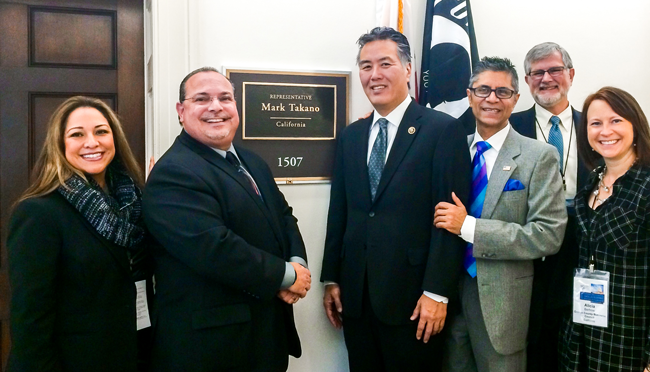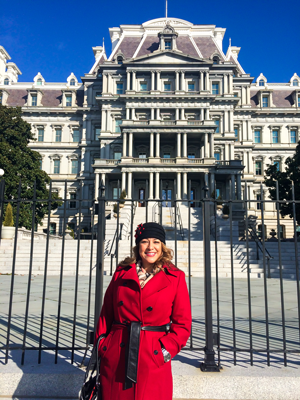
Former SDWP board president Rebecca Aguilera-Gardiner recently traveled to Washington, D.C. to represent San Diego as a Business Leaders United employer at the National Skills Coalition Skills Summit.
 Business Leaders United for Workforce Partnerships (BLU) is comprised of employers from a range of industries across the nation who are concerned about our nation’s skills gap, who are working with local partners to train and hire community residents for skilled jobs, and who want our country’s policymakers to follow suit and invest, aggressively and effectively, in the skills of America’s workers. BLU provides a common platform from which these diverse business leaders can jointly communicate to national policymakers, the press and the American public about the effective industry-based strategies they’ve developed which could serve as models for a more comprehensive national skills policy.
Business Leaders United for Workforce Partnerships (BLU) is comprised of employers from a range of industries across the nation who are concerned about our nation’s skills gap, who are working with local partners to train and hire community residents for skilled jobs, and who want our country’s policymakers to follow suit and invest, aggressively and effectively, in the skills of America’s workers. BLU provides a common platform from which these diverse business leaders can jointly communicate to national policymakers, the press and the American public about the effective industry-based strategies they’ve developed which could serve as models for a more comprehensive national skills policy.
“This was a very valuable trip and a different way to approach workforce development,” says Rebecca, owner of Diego and Son Printing. “This was the first time BLU was invited to participate in the Skills Summit and I felt there was a real impact and momentum in making changes to workforce system that would make it easier for business owners.”
Rebecca said she repeatedly shared with policymakers throughout the event that small businesses like hers believe in and need a skilled workforce. “We are here to tell you that these programs are important to us and need to continue. If you want us to grow, you need to continue to fund the workforce development system.”
The SDWP program most utilized by small businesses are On-the-Job Training (OJT) reimbursements. OJT helps businesses offset the cost of training new employees by reimbursing up to 50 percent of a new hire’s wages (for a maximum of 1,040 hours). Last year SDWP released a research study on San Diego’s small businesses and made a number of recommendations to support its growth.
Rebecca also joined several BLU employers at the White House with members of the administration’s National Economic Council (NEC). The NEC looked to BLU to discuss strategies for developing the White House’s work-based learning efforts — in particular, they were eager to hear ideas on how to make funding for work-based learning flexible enough for small and medium employers and different types of employers. BLU employers shared suggestions related to intermediary incentives, subsidies and tax credits, and long term training costs.
